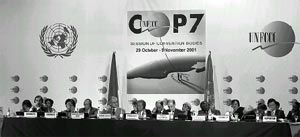Green future
Green future

countries finally managed to bring to close protracted negotiations on ways to reduce emissions of heat trapping green house gases (ghg) like carbon dioxide. The resulting agreement has no teeth and does not come close to the level of action required to arrest climate change. It instead dilutes commitments already made by countries under the Kyoto Protocol. The saving grace, however, is that it marks the beginning of a new phase of action and implementation.
In the final moments of a two week-long talks in Marrakech, Morocco, that ended on November 9, 2001, which tried to build over the political agreement reached at Bonn in July this year, over 170 countries agreed on rules to implement the 1997 Kyoto Protocol. The protocol makes it mandatory for industrialised countries to reduce their ghg emissions by a certain percentage below 1990 levels. These rules pave the way for ratification of the protocol before the end of 2002, a self-imposed deadline to ensure that nations have necessary policies and legislations in place to reduce emissions when the first five-year commitment period commences in 2008.
The present round was not bereft of the usual drama that has come to mark these talks as developing countries and the European Union (eu) caved in at the last minute to the obstructive designs of countries like Japan, Canada, Australia and Russia. In the post us rejection scenario, the protocol cannot enter into force unless, in addition to European countries, Japan, Canada, Australia and Russia also ratify. By exploiting their pivotal position, these countries have consistently managed to get concessions from developing countries and the eu, which are more interested in getting the protocol into force in the face of us opposition.
A decision on the controversial issue of legally binding nature of consequences in case an industrialised country does not meet its Kyoto commitments, was deferred to the first conference of parties after the protocol has entered into force. Confusion surrounded this issue as developing countries and the eu felt that the Bonn agreement would be legally binding. On the other hand, Canada, Australia and Russia insisted otherwise.
Eligibility conditions using mechanisms, like emissions trading and project based investments, helping industrialised countries fulfill their production targets at a lower cost were also debated hotly. Russia, Japan, Canada and Australia persistently tried to undermine these conditions. The final deal, however, upholds them. For instance, the deal makes it compulsory for industrialised countries to report sinks' activities that enhance carbon dioxide absorption by forests and crops in order to be able to engage in these mechanisms.
A welcome decision was that industrialised countries would not be allowed to bank carbon dioxide credits generated through sinks' activities to meet commitments in future commitment periods. Countries could bank credits generated from project-based investments in developing and industrialised countries but only upto 2.5 per cent of the amount they were allowed to emit. Under the Marrakech deal, the clean development mechanism (cdm), where an industrialised country can invest in a project that reduces ghg emission in a developing country and take credit for any reduction, takes a new form. Now a developing country can unilaterally start a project and sell credits to industrialised countries.
Almost a year after the climate change talks failed miserably in the Hague, The Netherlands, in November, 2000, and the protocol seemed all but dead with the us withdrawl in March, 2001, countries succeeded in resurrecting it but at a huge cost. The us continues to maintain that the protocol was not in its economic interest. "He (us president George Bush) agrees with the need to reduce ghg emissions. His cabinet review is underway, to determine a way that can be done without forcing America into deep recession,' said White House spokesperson Ari Fleisher. Since then, Japan, one of the most important countries necessary for the protocol to enter into force, has decided to ratify it. The eu is also expected to ratify the protocol. The next round of talks is slated from October 23-November 1, 2002, though the venue is yet to be decided.







